(完整版)unit1Festivalsaroundtheworld导学案
Unit 1 Festivals around the world 导学案1

Unit 1 Festivals around the world 导学案Period 1(单词学习课)Learning aims(学习目标):1、To improve the ability of remembering the words2、To master the usages of some important wordsImportant points(学习重点):Remember the new words in this unitDifficult points(学习难点):Master how to use some of the new words correctly.Learning guide(方法导引):Read, copy and reciteLearning Procedures(学习过程):Step 1: Try to remember the new words as quickly as possible(温馨提示:说一千,道一万,记住单词是关键!)1、Read and recite the new words and phrases three times.(方法导引:按音标正确读、背单词和短语)(A级)2、Copy the new words and phrases three times(方法导引:汉语只需要抄一遍:抄写后要求会默写合成词、派生词和重点短语)(A级)____________________________________________________________________________________ ____________________________________________________________________________________ ____________________________________________________________________________________ ____________________________________________________________________________________ ____________________________________________________________________________________ ____________________________________________________________________________________ ____________________________________________________________________________________ ____________________________________________________________________________________ ____________________________________________________________________________________ ____________________________________________________________________________________ ____________________________________________________________________________________ ____________________________________________________________________________________ ________________________________________________________________________3、根据所给单词首字母及中文释义写出单词(方法导引:先默写,然后核对答案,错误之处用红笔标出,写出正确答案后再次加以巩固)(B级)1).b_________(美,美人) 2).h____________(收获) 3).c___________(庆祝)4).h_________(猎人) 5).b____________(信任) 6).a____________(到达)7).g__________(获得) 8).g____________(搜集) 9).a____________(羡慕)10).c_________(衣服) 11).c__________(风俗) 12).w_____________(世界性的)13).f_________(愚人) 14).p__________(允许) 15).p__________(停放) 16).s__________(悲哀) 17).r__________(提醒) 18).f___________(饶恕)4、根据汉语释义写出短语(方法导引:先默写,然后核对答案,错误之处用红笔标出,写出正确答案后再次加以巩固)(B级)1).发生____________________ 2).纪念______________________3).盛装____________________ 4).搞恶作剧_________________________5).期待____________________ 6).日夜_______________________7).好像____________________ 8).玩得开心_________________________9).出现____________________ 10).守信用__________________________11).屏息___________________ 12).使…想起________________________学习反思:Step 2.Learn how to use some of the new words(方法导引:研读例句,译成汉语,记清搭配)(B级) 1.take place 发生,举行We have never found out what took place that night.______________________________When did the accident take place? ___________________________________________相关链接:take one’s place =take the place of sb. 代替某人易混辨析:take place, happen, occur, come about and break out 均为不及物动词或短语,均不可用于被动语态,通常不用进行时态;take place 通常指按计划或安排发生;happen通常指偶然发生;occur 较正式,指意外发生,occur to sb,指某人突然想起;come about 常指偶然发生,常与how连用;break out 指火灾,战争,瘟疫的突然爆发。
(完整版)高中英语Unit1Festivalsaroundtheworld学案
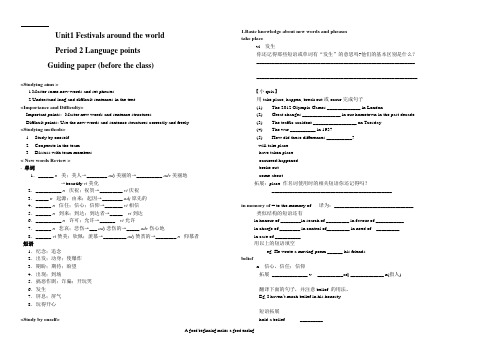
Unit1 Festivals around the worldPeriod 2 Language pointsGuiding paper (before the class)<Studying aims >1.Master some new words and set phrases2.Understand long and difficult sentences in the text.<Importance and Difficulty>Important points:Master new words and sentence structures.Difficult points: Use the new words and sentence structures correctly and freely.<Studying methods>1.Study by oneself2.Cooperate in the team3.Dissuss with team members.< New words Review >. 单词1.______ n. 美;美人→________ adj.美丽的→__________ adv.美丽地→beautify vt.美化2.__________ n. 庆祝;祝贺→_________ vt.庆祝3._____ n. 起源;由来;起因→________ adj.原先的4.______ n. 信任;信心;信仰→_______ vt.相信5.______ n. 到来;到达;到达者→_____ vi.到达6.__________ n. 许可;允许→______ vt.允许7.______ n. 悲哀;悲伤→___ adj.悲伤的→_____ adv.伤心地8.______ vt.赞美;钦佩;羡慕→_________ adj.赞赏的→________ n. 仰慕者短语1.纪念;追念2.出发;动身;使爆炸3.期盼;期待;盼望4.出现;到场5.搞恶作剧;诈骗;开玩笑6.发生7.屏息;屏气8.玩得开心<Study by onself> 1.Basic knowledge about new words and phrasestake placevi 发生你还记得那些短语或单词有“发生”的意思吗?他们的基本区别是什么?_____________________________________________________________________________________________________________________________【小quiz】用take place, happen, break out或occur完成句子(1) The 2012 Olympic Games _____________ in London.(2) Great changes _______________ in our hometown in the past decade.(3) The traffic accident _________________ on Tuesday.(4) The war __________ in 1937.(5) How did these differences __________?will take placehave taken placeoccurred/happenedbroke outcome about拓展:place 作名词使用时的相关短语你还记得吗?_______________________________________________in memory of = to the memory of 译为:_______________________________ 类似结构的短语还有in honour of ________in search of _________ in favour of ___________in charge of ________ in control of_________ in need of _________in case of __________用以上的短语填空eg. He wrote a moving poem ______ his friends .beliefn 信心,信任;信仰拓展______________ v. __________adj _____________ n(指人)翻译下面的句子,并注意belief 的用法。
人教课标必修三Unit1_Festivals_around_the_world语法导学案
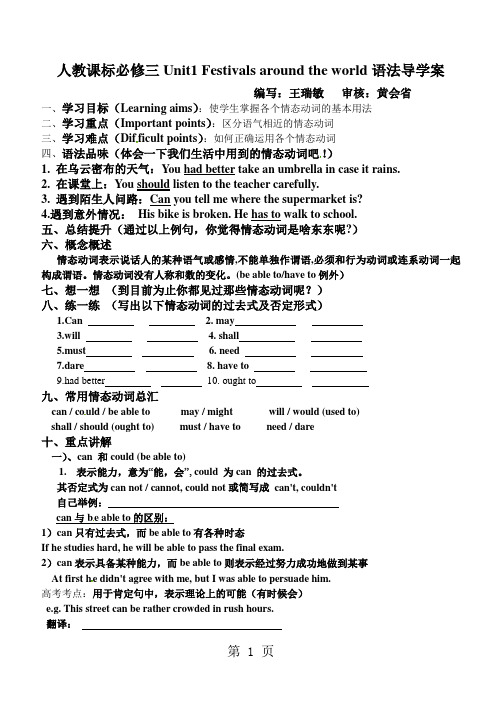
人教课标必修三Unit1 Festivals around the world语法导学案编写:王瑞敏审核:黄会省一、学习目标(Learning aims):使学生掌握各个情态动词的基本用法二、学习重点(Important points):区分语气相近的情态动词三、学习难点(Dif ficult points):如何正确运用各个情态动词四、语法品味(体会一下我们生活中用到的情态动词吧!)1. 在乌云密布的天气:You had better take an umbrella in case it rains.2. 在课堂上:You should listen to the teacher carefully.3. 遇到陌生人问路:Can you tell me where the supermarket is?4.遇到意外情况:His bike is broken. He has to walk to school.五、总结提升(通过以上例句,你觉得情态动词是啥东东呢?)六、概念概述情态动词表示说话人的某种语气或感情,不能单独作谓语,必须和行为动词或连系动词一起构成谓语。
情态动词没有人称和数的变化。
(be able to/have to例外)七、想一想(到目前为止你都见过那些情态动词呢?)八、练一练(写出以下情态动词的过去式及否定形式)1.Can2. may3.will4. shall5.must6. need7.dare 8. have to9.had better 10. ought to九、常用情态动词总汇can / co uld / be able to may / might will / would (used to)shall / should (ought to) must / have to need / dare十、重点讲解一)、can 和could (be able to)1.表示能力,意为“能,会”, could 为can 的过去式。
人教新课标Book3 Unit1 Festivals around the world导学案(3课时)

Book3 Unit1 Festivals around the world导学案Warming up-Reading第一课时课前预习学案学习目标:1. 了解世界各国的节日、含义、由来与民俗2. 学习有关节日和民俗的词汇,如:have fun with, custom, religious等3. 掌握本单元教学目的和要求中的词汇用法4. 进一步复习、巩固运用邀请及感谢的表达法5. 掌握一些情态动词的用法语篇解读:Ⅰ.First readingSkim the reading passage quickly and write down the main idea of it.The text tells us the kinds of today’s festivals. They have many __________, some _________, some seasonal and some for______________ or events.Ⅱ. Second readingⅢ. Third readingFind out the following phrases in the passage1. 以...的形状________________________2. 化妆_______________________3. 发生________________________4. 开玩笑_______________________4. 期望________________________ 6. 纪念_______________________7. 好像_________________________ 8. 玩的开心______________________9. 日夜________________________ 10. 赏月______________________IV. Analyze some important sentences1.Some festivals are held to honor the dead or to satisfy the ancestors, who might return either to help orto do harm.who 引导的是_________从句,先行词是_____________,who 在从句中作_______2.Some Western countries have very exciting carnival, which take place forty days before Easter, usually in February.which 引导的是__________从句,先行词是_______________take place ________________;3.The most energetic and important festivals are the ones that look forward to the end of winter and to the coming of spring.that引导的是___________从句,先行词是____________;look forward to__________________了解定语从句中引导词只能用that不能用which的几种情况(必修一精讲精练p47)4.①China and Japan have mid-autumn festivals, when people admire the moon and in China, enjoy Mooncakes.②It is now a children's festival, when they can dress up and go to their neighbours' homes to ask for sweets.when 引导的是___________从句,先行词是____________,____________在从句中作__________ admire the moon_____________ dress up_____________5. At that time people would starve if food was difficult to find, especially during the cold winter months. 主语+ be + adj. +to do 的形式,starve______________6. The country, covered with cherry tree flowers, looks as though it is covered with pink snow.covered with cherry tree flowers 作___________________, 修饰_________________as though =as if ____________________;Book3 Unit1 Festivals around the world导学案Warming up-Reading 第二课时课内探究学案学习目标:1. 让学生阅读理解世界各国各种节日的基本知识,引导学生认识节日的分类、节日对人们生活的影响,从更深入的层面理解各国节日的意义。
unit1 festival around the world导学案
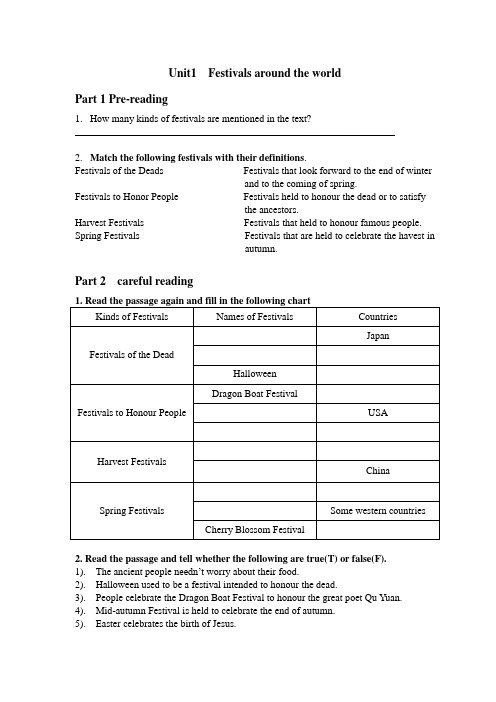
Unit1 Festivals around the worldPart 1 Pre-reading1.How many kinds of festivals are mentioned in the text?________________________________________________________________2.Match the following festivals with their definitions.Festivals of the Deads Festivals that look forward to the end of winterand to the coming of spring.Festivals to Honor People Festivals held to honour the dead or to satisfythe ancestors.Harvest Festivals Festivals that held to honour famous people. Spring Festivals Festivals that are held to celebrate the havest inautumn.Part 2 careful reading2. Read the passage and tell whether the following are true(T) or false(F).1). The ancient people needn’t worry about their food. ____2). Halloween used to be a festival intended to honour the dead. ____3). People celebrate the Dragon Boat Festival to honour the great poet Qu Yuan. ____4). Mid-autumn Festival is held to celebrate the end of autumn. ____5). Easter celebrates the birth of Jesus. ____Part 3 Post reading1.Choose the best answer1). Most ancient festivals would for the following except_____?A. planting in springB. raining in summerC. harvest in autumnD. the end of cold weather2). Which of the following are not mentioned in the passage?A.Carnival and Columbus DayB.Halloween and Spring FestivalC.Thanksgiving day and ObonD.Valentine’s Day and Fool’s Day3). At festivals people can do all the followings except______?A. forget their works for a little whileB. enjoy lifeC. travel around the worldD. be proud of their customs4). What can we learn from the passage?A. All festivals have been lasting for a long period.B. People like festivals just because they can eat a lot then.C. Different countries have different customs.D. People celebrate festivals in the same way.Part 4 SummaryRetell the passage by filling the following blanksThere are all kinds of festivals and ____________around the world, which are held for different reasons. Some festivals are held to________ the dead or satisfy the ________ in case they might return either to help or to _____________, while other festivals are held to honour famous people, such as ____________________ in China and Columbus Day. Havest and Thanksgiving festivals are happy events because the food is _________ for the winter and the ___________ work is over. And the most __________ and important festivals are the ones that ________________ the end of winter and to the_______ of spring. Such as the ______New Year in China. Festivals let us __________, be proud of our ________and forget our work for a little while.HomeworkWhat’s your favorite festival? After class you should find some information about the festival you like, and write it into an essay. You will be asked to introduce your favorite festival tomorrow.。
高中英语 必修3 Unit 1 Festivals around the world 精品导学案(含答案解析)
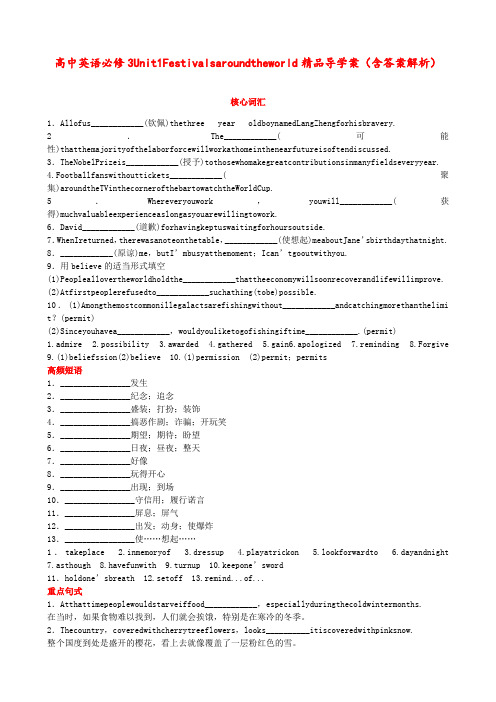
高中英语必修3Unit1Festivalsaroundtheworld精品导学案(含答案解析)核心词汇1.Allofus____________(钦佩)thethree year oldboynamedLangZhengforhisbravery.2.The____________(可能性)thatthemajorityofthelaborforcewillworkathomeinthenearfutureisoftendiscussed. 3.TheNobelPrizeis____________(授予)tothosewhomakegreatcontributionsinmanyfieldseveryyear.4.Footballfanswithouttickets____________(聚集)aroundtheTVinthecornerofthebartowatchtheWorldCup.5.Whereveryouwork,youwill____________(获得)muchvaluableexperienceaslongasyouarewillingtowork.6.David____________(道歉)forhavingkeptuswaitingforhoursoutside.7.WhenIreturned,therewasanoteonthetable,____________(使想起)meaboutJane’sbirthdaythatnight. 8.____________(原谅)me,butI’mbusyatthemoment;Ican’tgooutwithyou.9.用believe的适当形式填空(1)Peopleallovertheworldholdthe____________thattheeconomywillsoonrecoverandlifewillimprove.(2)Atfirstpeoplerefusedto____________suchathing(tobe)possible.10.(1)Amongthemostcommonillegalactsarefishingwithout____________andcatchingmorethanthelimi t?(permit)(2)Sinceyouhavea____________,wouldyouliketogofishingiftime____________.(permit)1.admire2.possibility3.awarded4.gathered5.gain6.apologized7.reminding8.Forgive9.(1)beliefssion(2)believe 10.(1)permission (2)permit;permits高频短语1.________________发生2.________________纪念;追念3.________________盛装;打扮;装饰4.________________搞恶作剧;诈骗;开玩笑5.________________期望;期待;盼望6.________________日夜;昼夜;整天7.________________好像8.________________玩得开心9.________________出现;到场10.________________守信用;履行诺言11.________________屏息;屏气12.________________出发;动身;使爆炸13.________________使……想起……1.takeplace 2.inmemoryof 3.dressup 4.playatrickon 5.lookforwardto 6.dayandnight 7.asthough 8.havefunwith 9.turnup 10.keepone’sword11.holdone’sbreath 12.setoff 13.remind...of...重点句式1.Atthattimepeoplewouldstarveiffood____________,especiallyduringthecoldwintermonths.在当时,如果食物难以找到,人们就会挨饿,特别是在寒冷的冬季。
人教版高中英语必修三Unit1Festivalsaroundtheworldword导学案4
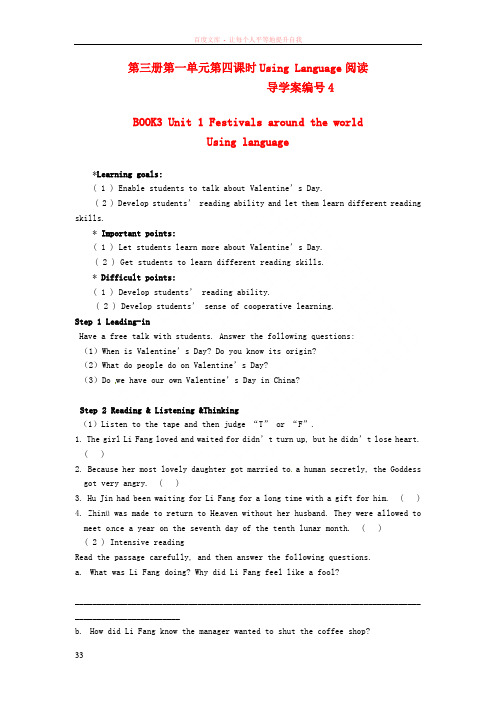
第三册第一单元第四课时Using Language阅读导学案编号4BOOK3 Unit 1 Festivals around the worldUsing language*Learning goals:( 1 ) Enable students to talk about Valentine’s Day.( 2 ) Develop students’ reading ability and let them learn different reading skills.* Important points:( 1 ) Let students learn more about Valentine’s Day.( 2 ) Get students to learn different reading skills.* Difficult points:( 1 ) Develop students’ reading ability.( 2 ) Develop students’ sense of cooperative learning.Step 1 Leading-inHave a free talk with students. Answer the following questions:(1)When is Valentine’s Day? Do you know its origin?(2)What do people do on Valentine’s Day?(3)Do we have our own Valentine’s Day in China?Step 2 Reading & Listening &Thinking(1)Listen to the tape and then judge “T”or “F”.1. The girl Li Fang loved and waited for didn’t turn up, b ut he didn’t lose heart. ( )2. Because her most lovely daughter got married to a human secretly, the Goddess got very angry. ( )3. Hu Jin had been waiting for Li Fang for a long time with a gift for him. ( )4. Zhinü was made to return to He aven without her husband. They were allowed to meet o nce a year on the seventh day of the tenth lunar month. ( )( 2 ) Intensive readingRead the passage carefully, and then answer the following questions.a.What was Li Fang doing? Why did Li Fang feel like a fool?_______________________________________________________________________________ ________________________b.How did Li Fang know the manager wanted to shut the coffee shop?_______________________________________________________________________________ ___________________________c. Why was the TV story what Li Fang needed?______________________________________________________________________________ ___________________________d.Why did Li Fang throw away flowers and chocolates for Hu Jin?_______________________________________________________________________________ __________________________e. What is the reason why Li Fang did not meet Hu Jin on time?______________________________________________________________________________ __________________________Step 3 TestingAfter you get some information from the passage, fill in the following blanks.Story 1Introdu ction Zhinv, the w 1 girl, the most l 2 of t he daughters, visited the earth and met Niulang, t he h 3 boy.Develop ment They f 4 , married secretly and were very happy.Climax (高潮)The Goddess of Heaven got so angry that she forced Zhinv back to H 5 . Niulang tried to f 6 her but was stopped by the Milky Way. Thus, the c 7 were separated.Ending The Goddess of Heaven allowed the couple to meet oncea year on the s 8 day of the s 9 l 10 monthwhen magpies made ab 11__ of their wings.Story 2Intro ducti on Li Fang was waiting alone at the c 1 shop with his roses and chocolates, but Hu Jin didn’t 2 . He thought she would keep her w 3 . Feeling like a f 4 , he would d 5 his sadness in coffee.Devel opmen t Li Fang watched a TV program about “Qiqiaojie”. Thinking Hu Jin played a t 6 on him, he t 7 away the gifts and s 8 off for home.Clima x (高潮) / Endin g As Li Fang passed the 9 shop on the corner, he heard Hu Jin ca lling and waving at him, “I’ve been waiting long. I have ag 10 for you! Why are you so late?” What would he do? Would she f 11 him?。
导学案Unit 1 Festivals around the world
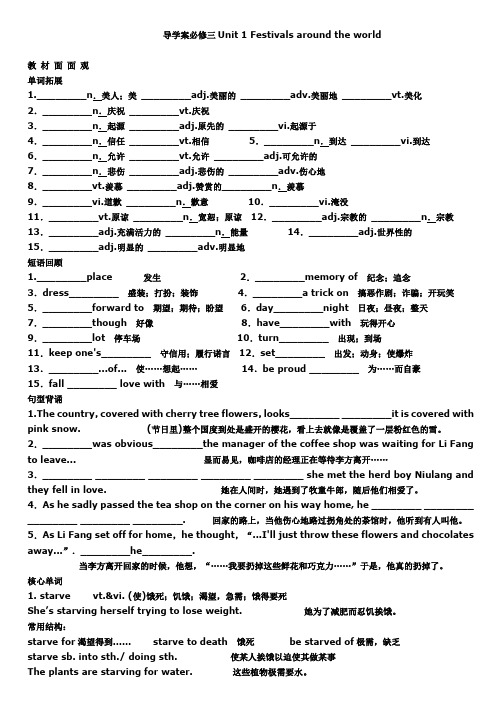
导学案必修三Unit 1 Festivals around the world教材面面观单词拓展1.________n.美人;美________adj.美丽的________adv.美丽地________vt.美化2.________n.庆祝 ________vt.庆祝3.________n.起源 ________adj.原先的 ________vi.起源于4.________n.信任 ________vt.相信 5.________n.到达________vi.到达6.________n.允许 ________vt.允许 ________adj.可允许的7.________n.悲伤 ________adj.悲伤的 ________adv.伤心地8.________vt.羡慕 ________adj.赞赏的________n.羡慕9.________vi.道歉________n.歉意10.________vi.淹没11.________vt.原谅________n.宽恕;原谅12.________adj.宗教的 ________n.宗教13.________adj.充满活力的________n.能量14.________adj.世界性的15.________adj.明显的________adv.明显地短语回顾1.________place 发生2.________memory of 纪念;追念3.dress________ 盛装;打扮;装饰4.________a trick on 搞恶作剧;诈骗;开玩笑5.________forward to 期望;期待;盼望 6.day________night 日夜;昼夜;整天7.________though 好像8.have________with 玩得开心9.________lot 停车场10.turn________ 出现;到场11.keep one's________ 守信用;履行诺言12.set________ 出发;动身;使爆炸13.________...of... 使……想起……14.be proud ________ 为……而自豪15.fall ________ love with 与……相爱句型背诵1.The country,covered with cherry tree flowers,looks________ ________it is covered with pink snow. (节日里)整个国度到处是盛开的樱花,看上去就像是覆盖了一层粉红色的雪。
高中英语 unit 1 Festivals around the world 课文导学案
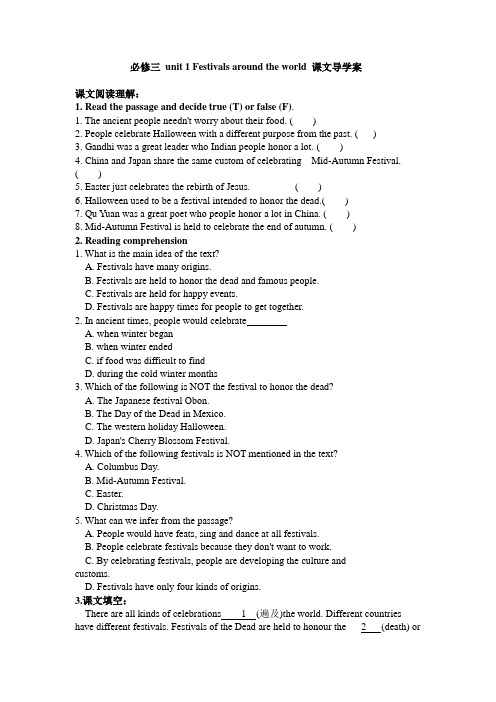
必修三unit 1 Festivals around the world 课文导学案课文阅读理解:1. Read the passage and decide true (T) or false (F).1. The ancient people needn't worry about their food. ( )2. People celebrate Halloween with a different purpose from the past. ( )3. Gandhi was a great leader who Indian people honor a lot. ( )4. China and Japan share the same custom of celebrating Mid-Autumn Festival. ( )5. Easter just celebrates the rebirth of Jesus. ( )6. Halloween used to be a festival intended to honor the dead.( )7. Qu Yuan was a great poet who people honor a lot in China. ( )8. Mid-Autumn Festival is held to celebrate the end of autumn. ( )2. Reading comprehension1. What is the main idea of the text?A. Festivals have many origins.B. Festivals are held to honor the dead and famous people.C. Festivals are held for happy events.D. Festivals are happy times for people to get together.2. In ancient times, people would celebrateA. when winter beganB. when winter endedC. if food was difficult to findD. during the cold winter months3. Which of the following is NOT the festival to honor the dead?A. The Japanese festival Obon.B. The Day of the Dead in Mexico.C. The western holiday Halloween.D. Japan's Cherry Blossom Festival.4. Which of the following festivals is NOT mentioned in the text?A. Columbus Day.B. Mid-Autumn Festival.C. Easter.D. Christmas Day.5. What can we infer from the passage?A. People would have feats, sing and dance at all festivals.B. People celebrate festivals because they don't want to work.C. By celebrating festivals, people are developing the culture andcustoms.D. Festivals have only four kinds of origins.3.课文填空:There are all kinds of celebrations 1 (遍及)the world. Different countries have different festivals. Festivals of the Dead are held to honour the 2 (death) orto satisfy the ancestors. Festivals can also 3 (hold) to honour famous people. In China, the Dragon Boat Festival honours the famous 4 (古代的) poet, Qu Yuan. The most energetic and important 5 _ (节日)are Spring Festivals 6 look forward to the end of winter and the coming of spring. At the Spring Festival in7 , people eat things such 8 dumplings, fish, and meat and give children lucky money in red paper. Some western countries have very 9 (excite) carnivals, which take place forty days before Easter, usually in 10 (二月).。
【范文】Unit 1 Festivals around the word导学案
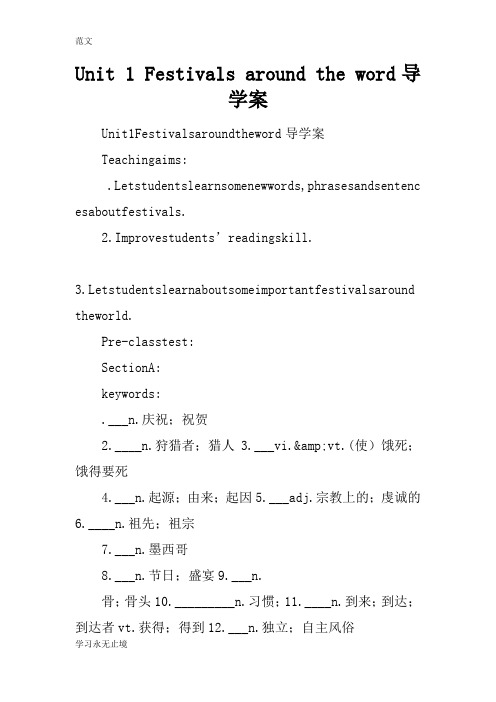
Unit 1 Festivals around the word导学案Unit1Festivalsaroundtheword导学案Teachingaims:.Letstudentslearnsomenewwords,phrasesandsentenc esaboutfestivals.2.Improvestudents’readingskill.3.Letstudentslearnaboutsomeimportantfestivalsaround theworld.Pre-classtest:SectionA:keywords:.___n.庆祝;祝贺2.____n.狩猎者;猎人3.___vi.&vt.(使)饿死;饿得要死4.___n.起源;由来;起因5.___adj.宗教上的;虔诚的6.____n.祖先;祖宗7.___n.墨西哥8.___n.节日;盛宴9.___n.骨;骨头10._________n.习惯;11.____n.到来;到达;到达者vt.获得;得到12.___n.独立;自主风俗3.___vt.&vi.&n.搜集;聚集4.___n.农业;农艺;农学5.___vt.授予;判定n.奖;奖品6.____vt.赞美;钦佩;羡慕7.__adj.充满活力的;积极的8.___n.诡计;恶作剧;窍门vt.欺骗;诈骗SectionB:keyphrases:._____纪念;追念2._____盛装;打扮;装饰3.____搞恶作剧;诈骗;开玩笑4._____期盼;期待;盼望5.___日夜;昼夜;整天6.___好像7.____玩得开心Pre-reading:.ShowsomepicturesaboutSpringFestival,andaskstud entsquestionsaboutit.HowaboutyourSpringFestival?‚whendoestheSpringFestivaltakeplace?ƒwhatdopeopleusuallytocelebrateit?2.Doyouknowothermainfestivalsinourcountry?canyousay somethingaboutit?3.Showsomepicturesaboutsomeforeignfestivals,andletstudentsdiscussmoreaboutthem,andsharetheirgroupworkw ithotherclassmates.4.Ifyouwanttoknowmoreaboutsomeofthem,let’senjoyourreading.ReadingStep1.ListeningListentothetextandfinishtheexercisesonP3.Step2.ExtensivereadingLetstudentsreadthetextingiventimeanddotheexerciseso nP4onexercisebook.Step3:IntensivereadingParagraphQuestionsparagraph1whendidancientpeoplecelebratefestivals?Paragraph2whatarethefestivalsarethedeadfor?Howdojapanesehonortheirancestors?whatdothemexicandoinmemoryofthedead?Paragraph3whydochinesehavetheDragonBoatFestival?whydoesIndiahaveanationalfestivalonoctober2?Paragraph4whatmakeautumnfestivalshappyevents?whatdoEuropeancountriesdotcelebrateharvestfestival?Paragraph5Howmanyfestivalsarementioned?whatdoesEastercelebrate?Paragraph6whydoespeoplelovetogathertogethertocelebratefestiva ls?Step4:Reflectioncomparethefestivalsofthedeadinmexico,japanandchina. whatthingsaresimilar?whatthingsaredifferent?HomeworkFestivalsAims/ReasonsAncientfestivalstocelebratetheendof____,plantingin___andharvestin________.FestivalsoftheDeadtohonorthedeadorsatisfythe______.Festivalstohonorpeopletohonor______people.Harvestfestivalstobegratefulfor_______andtheagriculturalworkis_____._____________to____the____ofwinterandthecomingofthespring.。
高一年级英语导学案Unit1Festivalsaroundtheworld

高一年级英语导学案主备人:审核人:编号:001课题:Unit1 Festivals around the worldTeaching aims and demands(课标要求掌握项目)1.话题:Festivals; how festivals began; how festivals are celebrated2.词汇:words and expressions in this unit3.功能:(1)打电话(Making phone calls)(2)邀请(Invitations)(3)感谢(Thanks)4.语法:情态动词的用法(1)can and could(2)may and might(3)will and would(4)shall and should(5)must and can’tThe first period: Warming up & pre-reading三维目标知识目标1. Get Ss to learn the useful new words and expressions in this part.2. Let Ss learn about different festivals.能力目标Enable Ss to talk about festivals.情感目标Encourage Ss to develop their interests in festivals.Section I 背景链接Revision: The important Festivals in China and western countries1.春节2.元宵节3,农历八月十五中秋节 4.国庆节5.农历五月初五端午节6.复活节7. 2月14日情人节8. 11月最后一个星期四美国感恩节9. 12月25日圣诞节10. 5月第二个星期日母亲节11. 6月第三个星期日父亲节12.阳历10月31号万圣节Section II 自主预习Discuss when they take place, what they celebrate and what people do at that time.讨论它们是什么时间举行,庆祝的是什么事件,并说出人们在那天所做的一件事。
Unit 1 Festivals around the word导学案
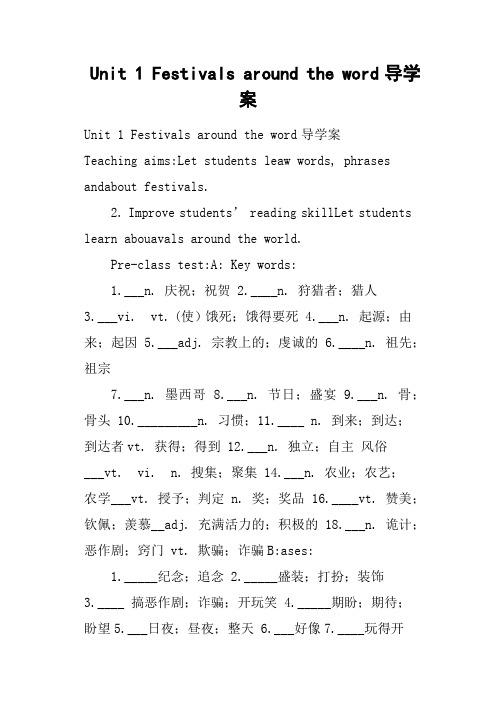
Unit 1 Festivals around the word导学案Unit 1 Festivals around the word导学案Teaching aims:Let students leaw words, phrases andabout festivals.2. Improve students’ reading skillLet students learn abouavals around the world.Pre-class test:A: Key words:1.___n. 庆祝;祝贺2.____n. 狩猎者;猎人3.___vi. vt. (使)饿死;饿得要死4.___n. 起源;由来;起因5.___adj. 宗教上的;虔诚的6.____n. 祖先;祖宗7.___n. 墨西哥 8.___n. 节日;盛宴9.___n. 骨;骨头 10._________n. 习惯;11.____ n. 到来;到达;到达者vt. 获得;得到 12.___n. 独立;自主风俗___vt. vi. n. 搜集;聚集 14.___n. 农业;农艺;农学___vt. 授予;判定n. 奖;奖品 16.____vt. 赞美;钦佩;羡慕__adj. 充满活力的;积极的 18.___n. 诡计;恶作剧;窍门 vt. 欺骗;诈骗B:ases:1._____纪念;追念2._____盛装;打扮;装饰3.____ 搞恶作剧;诈骗;开玩笑4._____期盼;期待;盼望5.___日夜;昼夜;整天6.___好像7.____玩得开心Pre-reading:wures about Spring Festival, and ask students quabou How about your Spring Festival?‚ When dg Festival take place?ƒ What do people usually to celebrate it?2. Do you knowavals in our country? Can you sag about it?wures abougn festivals, and let students discuabouand shagroup work wlassmaIf you waw more aboulet’ur reading.ReadingListeningLxt andxP2. Extensive readingLet students read the text in givand do the exP4 on exercise b: Intensive readingParagraphQuaragraWhen did ale celebravals?Paragraph2What avals are the dead for?How do Japaa?What dxican ddead?Paragraph3Why dave the Dragon Boat Festival?Why does India have a national festivalber 2? Paragraph4What make autuvals happy events?What do European countries do t celebrate harvval?Paragraph5How mavals ad?What does Easter celebrate?ParagraWhy dle love to gather toglebravals?: Reflavaldead in Mexico, Japan and China. What things are similar? What things are d?Home wFestivalsAims/ ReaAvallebrad of____, planting in ___ and harvest in ________.FestivalDeaddead or sa______.Festivall______people.Harvvalbe grateful for_______and the agricultural work is _____._________________the ____of winter andgg。
高中英语 Unit 1 Festivals around the World reading导学案(
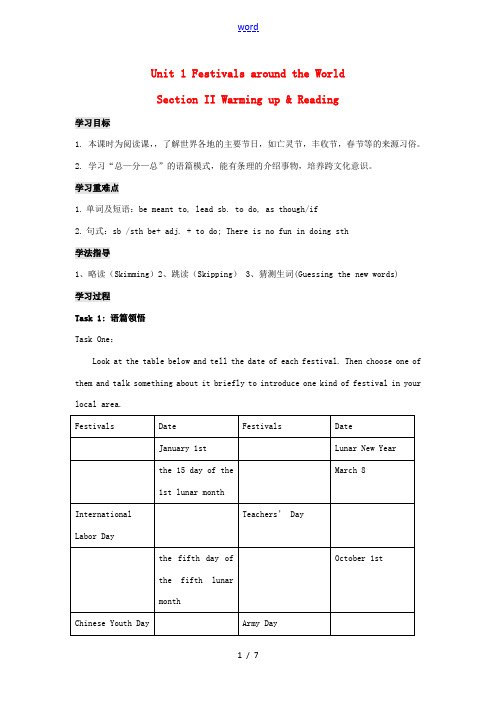
Unit 1 Festivals around the WorldSection II Warming up & Reading学习目标1. 本课时为阅读课,,了解世界各地的主要节日,如亡灵节,丰收节,春节等的来源习俗。
2. 学习“总—分—总”的语篇模式,能有条理的介绍事物,培养跨文化意识。
学习重难点1.单词及短语:be meant to, lead sb. to do, as though/if2.句式:sb /sth be+ adj. + to do; There is no fun in doing sth学法指导1、略读(Skimming)2、跳读(Skipping)3、猜测生词(Guessing the new words)学习过程Task 1: 语篇领悟Task One:Look at the table below and tell the date of each festival. Then choose one of them and talk something about it briefly to introduce one kind of festival in your local area.Task Two:Voice your opinionDescribe one of the festivals and tell the reason to your classmates. Try to use the following expressions: The festival that I think...is.../It falls on (I)dates back to…with a long histor y./ There are many colorful activities../I attach importance to…/ because it not only…but also…Task 2: 典句探究1. Festivals are meant to celebrate important times of year. (P1)1) This dog android is meant to guide blind people crossing the street.2) The a ctivity is meant to improve the students’ oral English.拓展: 短语为________,意思是:________ n. ________ v. ________adj. ________活用:1) The flashing lights mean that the road is blocked.2) What on earth do you mean?3) This new order will mean (us) working overtime.4) I only meant to help.5) Your friendship means a great deal to me.6) His family means nothing to him.翻译: means n.1) by all means __________________2) by means of __________________3) by no means __________________2. At that time people would starve if food was difficult to find, especially during the cold winter months. (P1)提炼:sb /sth be+ adj. + to do是一个重要的句式结构, _______的形式表示被动的意义。
Unit 1 Festivals around the world 导学案2
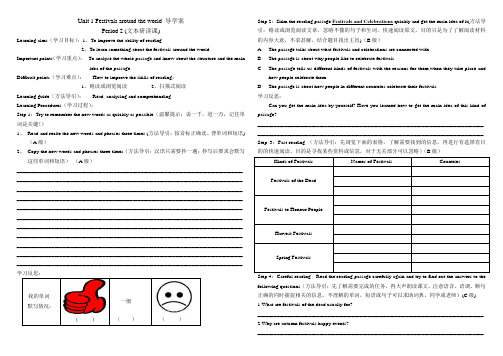
Unit 1 Festivals around the world 导学案Period 2 (文本研读课)Learning aims(学习目标):1、To improve the ability of reading2、To learn something about the festivals around the worldImportant points(学习重点):To analyse the whole passage and know about the structure and the mainidea of the passageDifficult points(学习难点):How to improve the skills of reading:1、略读或浏览阅读2、扫描式阅读Learning guide(方法导引):Read, analysing and comprehendingLearning Procedures(学习过程):Step 1:Try to remember the new words as quickly as possible(温馨提示:说一千,道一万,记住单词是关键!)1、Read and recite the new words and phrases three times.(方法导引:按音标正确读、背单词和短语)(A级)2、Copy the new words and phrases three times(方法导引:汉语只需要抄一遍:抄写后要求会默写这些单词和短语)(A级)____________________________________________________________________________________ ____________________________________________________________________________________ ____________________________________________________________________________________ ____________________________________________________________________________________ ____________________________________________________________________________________ ____________________________________________________________________________________ ____________________________________________________________________________________ ____________________________________________________________________________________ ____________________________________________________________________________________ ____________________________________________________________________________________ ____________________________________________________________________________________ 学习反思:Step 2:Skim the reading passage Festivals and Celebrations quickly and get the main idea of it(方法导引:略读或浏览阅读文章,忽略不懂的句子和生词,快速阅读原文,目的只是为了了解阅读材料的内容大意,不求甚解,结合题目找出主旨)(B级)A.The passage talks about what festivals and celebrations are connected with.B.The passage is about why people like to celebrate festivalsC.The passage tells us different kinds of festivals with the reasons for them,when they take place andhow people celebrate themD.The passage is about how people in different countries celebrate their festivals学习反思:Can you get the main idea by yourself? Have you learned how to get the main idea of this kind of passage?____________________________________________________________________________________ ____________________________________________________________________________________ Step 3:Fast-reading (方法导引:先浏览下面的表格,了解需要找到的信息,再进行有选择有目的的快速阅读,目的是寻找某些资料或信息,对于无关部分可以忽略)(B级)Step 4:Careful-reading Read the reading passage carefully again and try to find out the answers to the following questions(方法导引:先了解需要完成的任务,再大声朗读课文,注意语音、语调、断句正确的同时捕捉相关的信息,不理解的单词,短语或句子可以求助词典,同学或老师)(C级) 1.What are festivals of the dead usually for?____________________________________________________________________________________ 2.Why are autumn festivals happy events?____________________________________________________________________________________3.What do people usually do at spring festivals?____________________________________________________________________________________ 4.Why is it important to have festivals and celebrations?____________________________________________________________________________________ 学习反思:我真的按老师的要求读课文了吗?Step 5:Reading Comprehension(方法导引:课上定时训练,利用本节课所学略读、浏览阅读及扫描式阅读的方法快速准确找到自己所需要的信息)A holiday is any day when people lay aside their ordinary duties and cares.The word comes from Old English. At first, holidays honored some holy event or person. People in Great Britain and other countries speak of holidays as Americans speak of vacations.Every nation has its special holidays. China observes New Year’s Day(January 1),May Day and National as legal holidays, as it was on Oct.1,1949 that People’s Republic of China was founded.The Chinese have long celebrated the Chinese lunar year. In the United States, congress has declared several as legal days such as New Year’s Day (January 1);Martin Luther King,Jr’s Birthday,Washington’s Birthday; Thanksgiving Day and Christmas Day and so on. Some holidays celebrate special events in the development of a country, su ch as Greece’s Independence Day;Italy’s Liberation Day and India’s Independence Day.In the States, banks and schools usually close on a legal holiday. When such a holiday falls on Sunday, the following Monday is usually observed. Schools and organizations often celebrate days known as traditional holidays, although schools and business do not close then. Those holidays include Valentine’s Day and Halloween.1.Which of the following holidays has nothing to do with a country’s development?A.China’s Nationa l DayB.Valentine’s DayC.Italy’s Liberty DayD.America’s Independence Day2.From the passage we can infer that _______.A.Chinese will no longer observe the Spring FestivalB.students don’t have to go to school on any holidayC.Chinese and Americans share at least one holidayD.Americans can easily draw money from the banks on legal days3.In the sentence “China observes New Year’s Day(January 1)”,“observe” means _____.A.praiseB.spendC.celebrateD.careStep 6:Quiz(当堂检测方法导引:先回忆一下本节课所读课文主旨及主要内容,再读题做题)1.Which of the following is NOT true about the Western holiday Halloween according to the reading passage?A.It has its origin as an event to memorize the deadB.It is now popular among the children.C.The children might play tricks if they are not given anything.D.The children will put on their best clothes to make people happy.2.Which of the following festivals is used to honor someone?A.The New YearB.The Spring FestivalC.The Dragon Boat FestivalD.The Mid-Autumn Day3.What’s the purpose of the national festival on October 2 in India?A.To gain IndependenceB.To meet New YearC.To honor the deadD.To honor Mohandas Gandi4.Which of the following is a happy event?A.Thanksgiving festivalB.Columbus DayC.The Dragon Boat FestivalD.Both A and B5.Which of the following is NOT true according to the Spring Festival?A.To eat dumplingsB.To make the ancestors happyC.To give children lucky moneyD.To eat fish and meatAn English joke:Not to Be Taken OutMark Twain once went to borrow a certain book from a neighbour in Tarry town. “ May I b orrow a book from you? ” he asked politely. “ Yes, you're more than welcome to it, ” the neighbour told him. “ But I must ask you to read it here. You know I make it a rule never to let any book go out of my library. ”Some days later the neighbour wished to borrow Mark Twain's machine for cutting grass in the garden. “ Why, certainly, ” Mark Twain told him. “ You're more than welcome to it. But I must ask you to use it here. You know that I make it a rule never to let it go out of my garden. ”。
Unit 1 Festivals around the world Grammar 导学案1-人教必修3精品
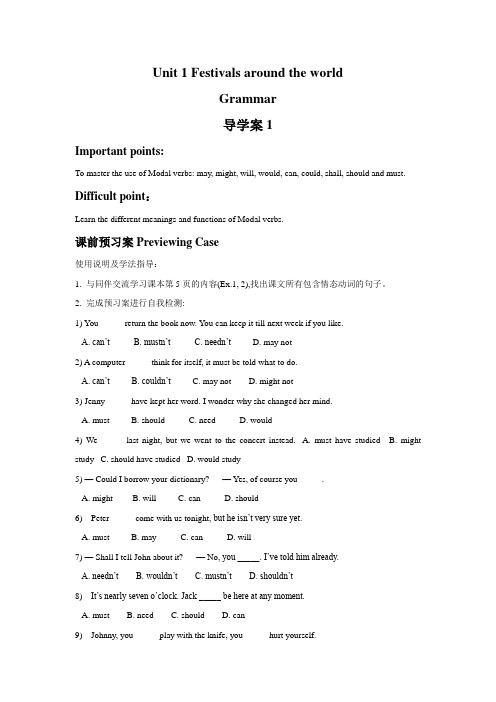
Unit 1 Festivals around the worldGrammar导学案1Important points:To master the use of Modal verbs: may, might, will, would, can, could, shall, should and must. Difficult point:Learn the different meanings and functions of Modal verbs.课前预习案Previewing Case使用说明及学法指导:1. 与同伴交流学习课本第5页的内容(Ex.1, 2),找出课文所有包含情态动词的句子。
2. 完成预习案进行自我检测:1) You _____ return the book now. You can keep it till next week if you like.A. can’tB. mustn’tC. needn’tD. may not2) A computer _____ think for itself, it must be told what to do.A. can’tB. couldn’tC. may notD. might not3) Jenny _____ have kept her word. I wonder why she changed her mind.A. mustB. shouldC. needD. would4) We _____ last night, but we went to the concert instead. A. must have studied B. might study C. should have studied D. would study5) — Could I borrow your dictionary? — Yes, of course you _____.A. mightB. willC. canD. should6) Peter _____ come with us tonight, but he isn’t very sure yet.A. mustB. mayC. canD. will7) — Shall I tell John about it? — No, you _____. I’ve told him already.A. needn’tB. wouldn’tC. mustn’tD. shouldn’t8) It’s nearly seven o’clock. Jack _____ be here at any moment.A. mustB. needC. shouldD. can9) Johnny, you _____ play with the knife, you _____ hurt yourself.A. won’t; can’tB. mustn’t; mayC. shouldn’t; mustD. can’t; s houldn’t10) The fire spread through the hotel very quickly but everyone _____ get out.A. had toB. wouldC. couldD. was able to11) — When can I come for the photos? I need them tomorrow afternoon.— They _____ be ready by 12:00.A. canB. shouldC. mightD. need12) — Will you stay for lunch? — Sorry, _____. My brother is coming to see me.A. I mustn’tB. I can’tC. I needn’tD. I won’t13) —Are you coming to Jeff’s party? —I’m not sure. I _____ go to the concert instead.A. mustB. wouldC. shouldD. might14) — Write to me when you get home. — _______.A. I mustB. I shouldC. I willD. I can15) — Is John coming by train?— He should, but he _____ not. He likes driving his car.A. mustB. canC. needD. may课堂探究案Exploring CasesListen to a song and fill in the blanks with the modal verbs:(听一首歌,并用情态动词填空):I Want To Be With YouThere are things that _______ be done That are not yet begunThings that I ______ do When I want to be with youAlthough we _______ be far apart You ______ be with me in my heartNo one else _______ do I just want to be with you I want to be with you_______ you hear me? I need you near me. I want to be with youI need you near me, my love. The two of us ________ be one Mother of my sonNo one else _________ do I just want to be with you I want you to be with me______ you hear me? I need you near me. I want to be with you I need you near me, my love 探究点一:must , can/could, may/might 表“推测”时的用法:1.must 表示推测时, 只能用于肯定句。
高中英语 Unit1 Festivals around the world导学案4 新人教版必修3
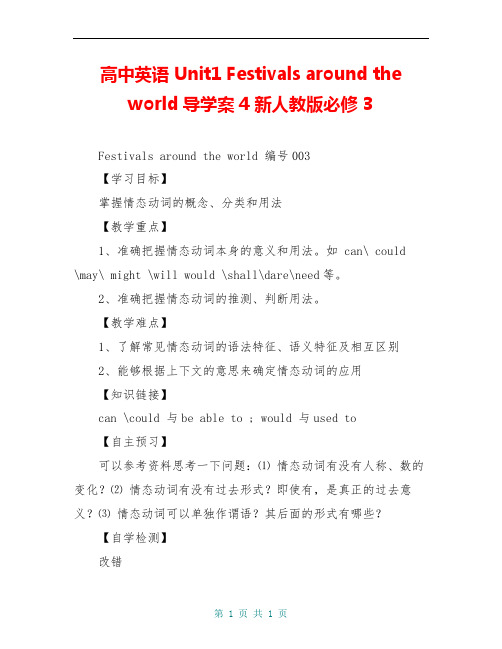
高中英语 Unit1 Festivals around the world导学案4 新人教版必修3Festivals around the world 编号003【学习目标】掌握情态动词的概念、分类和用法【教学重点】1、准确把握情态动词本身的意义和用法。
如 can\ could \may\ might \will would \shall\dare\need等。
2、准确把握情态动词的推测、判断用法。
【教学难点】1、了解常见情态动词的语法特征、语义特征及相互区别2、能够根据上下文的意思来确定情态动词的应用【知识链接】can \could 与be able to ; would 与used to【自主预习】可以参考资料思考一下问题:⑴ 情态动词有没有人称、数的变化?⑵ 情态动词有没有过去形式?即使有,是真正的过去意义?⑶ 情态动词可以单独作谓语?其后面的形式有哪些?【自学检测】改错1、Could you lend me a book ? No, I can’t 、2、 He musts have been sleeping all the night 、3、 He can is very forgotful sometimes 、4、 May I use your telephone ? No , you may not 、5、 If you may , you do it 、6、 Must I go there now ? No 、you mustn’t 、7、 I suggestedthat he would go to see the doctor 、8、 Will you like to go to the cinema ?9、You needn’t to was te time in helping hisEnglish 、10、I wish you happy , don’t I ?【预习疑问】【课堂探究】1、can could ; be able to 观察:⑴ I can speak fluent English now, but I couldn’t last year 、现在我能流利说英语,但去年我不能。
高中英语 Unit 1 Festivals around the world Using language导学案(学生版)新人教版必修3

高中英语 Unit 1 Festivals around the world Using language导学案(学生版)新人教版必修3Festivals around the world Using language导学案(学生版)新人教版必修3第课时课题名称时间第周星期课型Using language主备课人目标1、Learn useful words and expressions in this part:2、Retell the story with the students’ o wn words、重点Learn more about festivals、二次备课难点Develop the reading skills of students by extensive reading、自主学习快速阅读课本第7页文章,完成下列字词翻译(3 minutes to finish)1、心碎的____________2、出现_________3、遵守诺言___________4、屏住呼吸________5、给某人道歉________6、很明显,显然________7、银河____________8、织女_____________9、动身,出发 _________10、提醒某人某事_________11、原谅某人_________问题生成记录:精讲互动1、apologize词性____ 词义:_________【用法】You must apologize to the teacher for being so rude、因为某事向某人道歉:_____________【拓展】n、________ make an apology sb (doing)sth、2、 obvious词性___ 词义:__________【用法】很明显… _________________ (句型)3、 remind【用法】1)He reminded me of my promise、____________________________【用法】2)He reminded me to get up early、__________________________【用法】3)He reminded that I should have been more careful、_____________4、 turn up【用法】He hasn’t turned up so far、词义:_________【拓展】turn down______ turn off______ turn on______turn out ______ turn to sb、 for help______5、hold one’s breath _____________【拓展】lose one’s breath= be out of breath _______6、 set off【用法】Tom and his father set off for America yesterday 词义:_____________【用法】The bomb set off among the crowd、词义:_____________【拓展】set about doing sth、 = set out to do sth 达标训练短文改错(共10小题;每小题1、5分,满分15分)假定英语课上老师要求同桌之间交换修改作文,请你修改你同桌写的以下作文。
- 1、下载文档前请自行甄别文档内容的完整性,平台不提供额外的编辑、内容补充、找答案等附加服务。
- 2、"仅部分预览"的文档,不可在线预览部分如存在完整性等问题,可反馈申请退款(可完整预览的文档不适用该条件!)。
- 3、如文档侵犯您的权益,请联系客服反馈,我们会尽快为您处理(人工客服工作时间:9:00-18:30)。
Unit1 Festivals around the world
Reading: Festivals around the world
Before class(课前准备与自主学习)
Words and expressions:
(1)__________ 宗教上的(2)__________祖先,祖宗
(3)__________ 纪念,追念(4)__________日夜
(5)__________ 穿上盛装,打扮(6)__________ 奖,奖品
(7)__________ 搞恶作剧,开玩笑(8)__________ 好像
(9)__________ 玩的开心(10)__________赞美;钦佩(11)__________期望;盼望(12)_________发生
In class(课堂探究学习)
1. Skimming: read the passage quickly and check the answers.
Task1: What is the main idea of the text?
A. An introduction to four kinds of festivals.
B. The differences among four kinds of festivals.
C. How to celebrate four kinds of festivals.
D. Festivals have different origins.
2. Scanning: read carefully to get the detailed information.
Task2: Fill in the blanks. (para1)
Most ancient festivals would celebrate the end of ____ _______, planting in ______ and harve st in _______. Today’s festivals have many origins, some ________, some seasonal and some for special ______ or ______.
Task3: Festivals of the dead. (para2)
(1)What are festivals of the dead held for?
The festivals are held to _____ the dead or to ______ the ancestors.
(2)What do people do at each festival?
Obon: clean, light, play
Day of the dead: eat, offer
Halloween: dress up, ask for, play a trick on
Task 4: Match: Festivals to honor people. (para3)
Task 5: Harvest festivals. (para4)
People are grateful because __________.
1. their food is ________ for the winter.
2. the _________ work is over.
National Festival on
October 2
The Dragon Boat
Festival
Columbus
Day
USA
China
European countries: decorate, get, win
China and Japan: admire, enjoy
India
Task 6: Spring Festivals. (para5)
Spring festivals _____________ the end of winter and to __________________.
3. Activities:
Discussion: Which one do you like better?
Chinese festivals OR Western festivals
Activity2: A short play to present the festivals around the world.
4. After class
Homework:
Find out more information about festivals around the world.
课外知识补充:国内外主要的节日名称……
Japan’s cherry blossom : be covered with
Western countries: carnivals, Easter
Chinese spring festival: eat, give, there are, celebrate。
